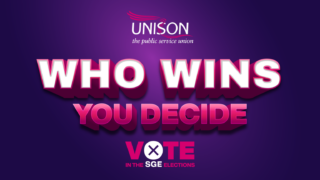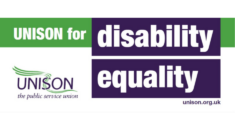“Bring it on, Boris; bring it on.” That was the defiant message from UNISON assistant general secretary Christina McAnea today, when she addressed the union’s women’s conference in Bournemouth.
“Here we are, two weeks after Brexit; two months after the general election – and the landscape of the UK looks and feels very different now.
“Whichever way you voted, and however fed up you are with it, it’s impossible not to talk about it.”
“Indeed,” continued Ms McAnea, “it would be irresponsible of us not to prepare and plan for life under a Tory government with such a huge majority.”
She told delegates that UNISON would not stop developing its work – work that included launching the union’s new guidance on sexual harassment during the conference.
There’s work on having domestic violence recognised as a workplace issue too: “We’re lobbying for a week’s paid leave, and I want to congratulate the Welsh government for supporting this,” she stated.
Work for a clear menopause policy in all workplaces is another ongoing campaign, “because this is no longer something we talk about in hushed voices, like something from a Les Dawson sketch.
“This is serious when it affects your ability to work, affects your attendance – and ultimately, can affect your job.”
Fifty years after the Equal Pay Act was passed, that struggle continues – and the historic strike in Glasgow proved that UNISON can win there too.
Ms McAnea then explained how, in preparing for her speech, shed had been reading the transcript of the debate in the House of Commons in 1936 about granting equal pay to male and female civil servants.
A fascinating piece of history
“The arguments for equal pay – as you would expect – were fairness for doing the same job.
“The arguments against equal pay were interesting! One argument was that, as equal pay didn’t exist in wider society, therefore it shouldn’t apply in the public sector.
“Perhaps more predictably, another was that it was unfair on men, as they were breadwinners and had more family responsibilities.”
And she continued by saying that she was was “amazed by something else in that debate: they said that granting equal pay to female civil servants would only affect 15% of the women employed in the civil service – 15%!
“Why? Because only that number worked in grades that were open to both men and women. They were called ‘common entry grades’.
“The vast majority of women in the civil service were in ‘women’s jobs’, which of course, were lower-graded administrative roles.
“In effect the jobs were segregated. Women weren’t even allowed to apply for the majority of jobs.”
Ms McAnea was clear that this was not simply in the past. “Today, we might not have enforced segregation, but we still have segregation.
“Think about cleaners, catering staff, childcare workers, care workers, teaching assistants and health care assistants.
“What do these jobs have in common?
“They are predominately done by women – and the other thing they have in common is low pay or lower pay.”
She used this to comment on how, “as a society, we don’t value the skills in these jobs.
“Caring skills, cooking or cleaning skills, or the skills needed to look after children or the elderly, are not valued as they should be.
“People are paid more for looking after animals in a zoo than for looking after children in a nursery.”
We need to value jobs
That, stressed Ms McAnea, is why the value we place on jobs – as well as the pay – is so important.
And it’s why, 50 years since equal pay became law, UNISON has to continue leading the fight for equal pay.
But she was also keen to point out that, although today’s challenges feel overwhelming, “it’s important to remind ourselves that unions weren’t set up because everything was going well.
“We came about because of injustice and unfairness in society and in the workplace.”
Even with Boris Johnson in office, with a big majority, Ms McAnea asserted that UNISON is in a “great place to take them on: we are the fastest growing union in the UK, the biggest in the UK, with the highest satisfaction levels – 20% higher than any other union.
“But most of all, we’re in a union made up of people who make a real difference.
“Which is why I’m optimistic about the future. Even with this government, I believe we’re in a great place to fight back, because I look around our union and I see strong, brave, fierce women and men who won’t be intimidated.”
So bring it on, Boris; bring it on.








